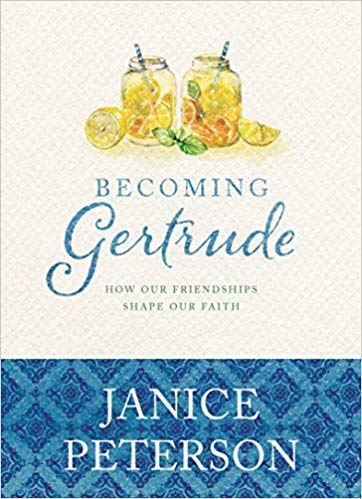
Embracing what God does for you is the best thing you can do for him. Don’t become so well-adjusted to your culture that you fit into it without even thinking. Instead, fix your attention on God. You’ll be changed from the inside out (Romans 12:2).
What does it really mean to accept someone in friendship? In our current age, acceptance and tolerance are hard words. We find it difficult to understand those who disagree with us. We struggle to accept those who are different from us. But when I think about acceptance in spiritual friendship, I like to set all of that baggage aside. As the dictionary says, acceptance is simply "the action of consenting to receive or undertake something offered." So what are those around us offering in friendship? And are we willing to receive the gifts and love that are being offered? Are we willing to accept people as God made them?
Accepting a friend means choosing to invest and love despite differences.
A spiritual friend is someone you enjoy being with, but you may not always find the friendship simple or straightforward. The important thing is that you’re able to spend time and go deep with that person, and you learn to appreciate each other’s differences. The differences between ourselves and others are valuable and help us have more profound perspectives on our own lives. My friend Jean and I are different in so many ways. I was a Protestant pastor’s wife; Jean was Roman Catholic and planned on being a nun. She traveled all around the world to find her niche. But accepting the differences made our friendship so much richer. I really respected and admired her, particularly in how she was taking deliberate steps to serve in the best way she could.
Accepting a friend means not running away when things get hard.
Sometimes I’ve had friendships with people who are going through a difficult time in their marriage, and even having those marriages come to an end. But I come alongside them, listen to them, and provide a solid friendship for them that they can depend on, no matter what they’re going through. Acceptance is not running away when things get hard. It’s not being friends only when it’s easy. It’s choosing to invest and love no matter the circumstance.
3 Levels of Acceptance – Where Do Your Friends Fit?
I am what you might call a “classic” extrovert. I like people—a lot. I like to be with people. I need socialization. And so, as a people person, I tend to accept and like people at face value. But even in my experience as an extrovert, I’ve found that there are three levels of accepting others, and it’s important to discern which is which in our lives.
1. Level One: easy, natural friendships with people who are easy to love
Some people, the ones in the first level, are easy to accept and love because we’re in similar seasons of life and we “get” each other. In these friendships, acceptance is often about more superficial things—opinions about politics, or simply a struggle connecting because of different schedules. We must learn to navigate disagreements and life differences with grace, understanding that the friendship is more important than being right all the time.
2. Level Two: difficult friendships that require more intentionality and perseverance
The second level of acceptance has to do with people who are hard to love. Perhaps these people are more difficult to accept because their lives are very different from ours. Perhaps they frustrate or annoy us. Sometimes they hurt us, or they cause extra weariness in our lives. Friendship with them is not the mutually gratifying, helpful experience we’ve talked about in this book so far. But that doesn’t mean there’s not spiritual value in being friends with someone who is hard to love. In fact, God uses those people to develop our strength and character. He helps us learn patience and unselfish caring. As Luke 6:32-36 says,
If you only love the lovable, do you expect a pat on the back? Run-of-the-mill sinners do that. If you only help those who help you, do you expect a medal? Garden-variety sinners do that. If you only give for what you hope to get out of it, do you think that’s charity? The stingiest of pawnbrokers does that.
I tell you, love your enemies. Help and give without expecting a return. You’ll never—I promise—regret it. Live out this God-created identity the way our Father lives toward us, generously and graciously, even when we’re at our worst. Our Father is kind; you be kind.
To connect with someone who is different from me, I get on their level. I do the things they’re interested in, connect with them where they are. It’s incarnational living—choosing to “become flesh” where someone is, not demanding they come to you and figure out your life instead. When people feel safe with you—when they feel seen and understood—they begin to trust you. Trust flowing back and forth in relationship is so crucial for this kind of spiritual friendship we’ve been talking about.
3. Level Three: “friendships” that we need better boundaries for because they are not safe for you.
Of course, a person can get hurt living like that. When you accept another person at face value, you might get hurt or be used. That’s why it’s important to be aware of the third level of acceptance: recognizing those who don’t get the same kind of welcome into our lives because their role is not “safe.”
We do need to be careful of some people. If someone has been abusive or hurt you deeply, you need to set good boundaries. Acceptance doesn’t mean that you set aside healthy limits or allow people in who are going to damage you or those you love. Sometimes it takes a while to realize that you need to set good boundaries with a person. Sometimes acceptance is accepting that someone will be better served by learning a hard lesson apart from you.
I have been fortunate—I have had only one bad relational experience in my whole life (though it was big and hurtful). I’m grateful that I’ve been able to live open to others, because in that posture of acceptance, I’ve seen the richest spiritual friendships emerge.

Janice Peterson is the wife of beloved pastor and author Eugene Peterson and the mother of three. Becoming Gertrude, her first book, illustrates the legacy of a life of faith and intentional relationship.
© NavPress 2018. Used by permission of NavPress (rights managed by Tyndale House Publishers, Inc.). All rights reserved.
Photo credit: ©Thinkstock






